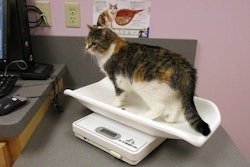
Pet obesity is a significant and growing problem, especially in developed pet food markets; in the U.S. alone, 59% of dogs and 61% of cats were considered overweight or obese, according to the Association for Pet Obesity Prevention’s 2022 report.
A recent study on using specific strains of probiotics may show promise in addressing pet obesity, at least in dogs in this case. While the common disclaimer of “additional research is needed” definitely applies here, it’s worth watching whether a popular nutritional/health product category — probiotics — proves to offer answers. It’s also interesting to consider possible parallels with human weight and obesity.
Probiotics study offers insights on research model for humans
In the study on probiotics and canine obesity, researchers in the Department of Agricultural Biotechnology, College of Agriculture and Life Science, at Seoul National University, Korea, identified two strains that seemed to reduce weight in obese dogs. To evaluate the probiotic capability of the strains, the researchers used a lifespan analysis of Caenorhabditis elegans. “C. elegans is a well-established genetic model with the advantage of relatively simple genetic editing and a shorter life expectancy than other animal models,” they wrote in their paper, published in Microbiology Spectrum journal.
The positive results not only show that using the two probiotic strains may benefit obese dogs; the use of C. elegans also offers potential applications for “interventions aimed at enhancing metabolic health in various mammals,” the researchers said. That could include cats and other mammalian pets, as well as humans, because C. elegans “serves as a human homolog model.”
Thus, just as research on cancer in dogs is yielding information of possible use for treating cancer in humans (and vice versa), this could develop into an area of study benefiting multiple species. To date, research on using probiotics to help people lose weight has produced mixed results. “While good bacteria help you break down nutrients and get energy from your food, there isn’t clear evidence that taking a probiotic supplement or food containing probiotics can help you lose weight,” read a January 2024 overview article on WebMD.
The way bacteria affect weight is still not completely understood, the article said; and though some studies have shown certain strains can slow weight gain, others can reduce waste size and still others may help with weight loss, some researchers have been unable to find a connection between bacteria and weight. Other caveats include that in some studies showing weight loss in people taking probiotics, the participants also pursued other weight loss techniques such as restricting calories or increasing physical activity.
Is addressing cravings the key to addressing weight loss?
Of course, when it comes to weight loss in humans these days, the focus (some might say hype) is on medications initially developed to treat diabetes that have proven to also help limit food cravings and lead to dramatic weight loss. The discovery that these drugs can significantly help people lose weight seems to be morphing into that being the main, even sole, reason for prescribing and taking them.
It’s tempting to wonder whether a similar medication protocol could be on the horizon for overweight or obese pets, though that may be far-fetched and even ill-advised. Yet the craving angle may provide another potential area for research in pets.
Even though most domesticated pets don’t choose or serve themselves their own food (save the occasional breaking into a bag or stealing food off the counter), some dogs and cats do seem to crave food more than others. Labradors, for example, are notorious for being chowhounds and, thus, prone to overweight or obesity. My cat, Deacon, used to follow this same profile, until old age and digestive health problems started diminishing his appetite.
It's well known that pet owners giving into their pets’ begging, whining or big, sad eyes often leads to overfeeding. In a 2023 study of more than 600 U.S. dog owners conducted by Pro Plan Veterinary Diets, from 54% to 75% agreed that they feed their dogs more food, table scraps or treats when the dogs beg, believe food is the primary source of their dogs’ happiness or feel guilty when their dogs seem hungry. This, despite 88% of respondents being concerned about their pets’ body condition and 92% believing weight loss would be beneficial.
Promise for more benefits and breakthroughs
These are still early days in terms of obesity research, even on the human side to some extent. (For example, medical experts aren’t entirely sure how the diabetes medications work to reduce weight in people.) Yet the probiotics study with dogs shows promise; let’s hope it leads to even more positive findings and benefits toward tackling pet obesity.



















